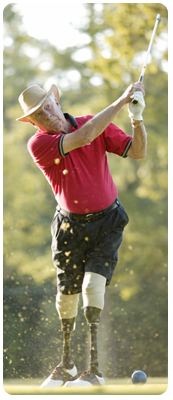Enthralled, he stared at the
glossy cover. Before his injury, Wilson
had been a talented golfer with
a 4 handicap. Why couldn’t he go
back out there on the links and start
whacking long drives and artful
chip shots again — even if he had
to do it while perched on a pair of
metal-and-plastic legs?
For the gutsy Wilson, who’d
grown up working long hours on a Wayne,
N.J., chicken farm before putting himself
through FDU at night, returning to the
fairways would require great determination.
But he did it. “I was utterly exhausted
after my first round,” he recalls
with a chuckle, “and I fell on my face two
or three times.
“But, hey, I shot a 45 that day, and I
was elated. I could play golf again! And
that realization lifted my spirits enormously.
All at once, I knew I could make it.”
What followed was a remarkable
sports and public service career in which
Wilson would
spend more than
25 years building
an organization — the National
Amputee Golf Association,
or NAGA
(
www.nagagolf.org),
in Amherst, N.H., which
is dedicated to helping disabled
Americans cope with their injuries by
teaching them how to become good at
golf.

While serving two terms as the executive
director of the 2,000-member NAGA
(1986–1995 and from 2000 to the present),
Wilson launched a magazine (
Amputee
Golfer) and a fast-growing program of
golf-instruction clinics (First Swing) aimed
at transforming struggling beginners with
disabilities into accomplished golfers.
In recent years, First Swing has focused
heavily on helping disabled veterans of the
Iraq war deal with injuries sustained
there. Says the smooth-putting NAGA
chief exec, these days a 12 handicap: “If I
can help just one amputee to a better life
through golf, that makes my day!”
Wilson says he’s “very grateful” for
the disaster that nearly destroyed his life.
“This may sound hard to believe,” he
reflects with a quiet smile, “but losing my
legs was probably the best thing that ever
happened to me. Painful as it was, that
event brought me to my life’s work of trying
to help other disabled people cope with
their injuries.
“I’m a hopeful guy, really. An optimist.
Showing other disabled people how to
hit long drives and nail challenging putts
— hey, there’s no joy like it!”

